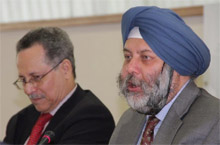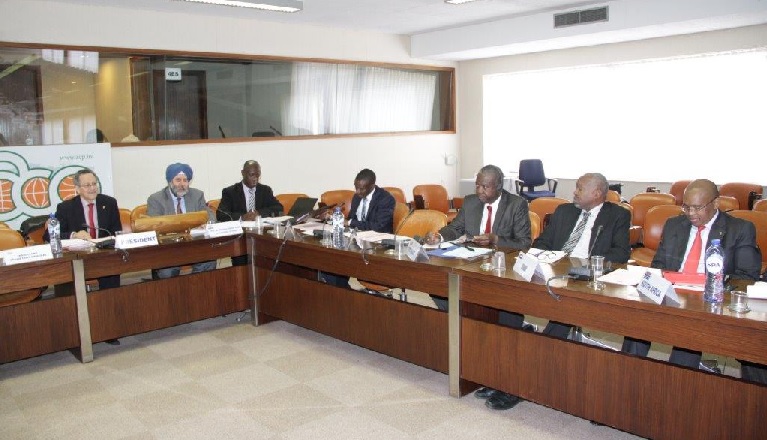ACP envoys discuss “new norms” for development cooperation with Indian ambassador
 Brussels, 16 May 2014/ ACP: Indian Ambassador to the EU H.E Manjeev Singh Puri called for enhanced South-South and Triangular cooperation, in a special discussion with fellow African, Caribbean and Pacific diplomats on Tuesday, at the invitation of the Working Group on Future Perspectives of the ACP.
Brussels, 16 May 2014/ ACP: Indian Ambassador to the EU H.E Manjeev Singh Puri called for enhanced South-South and Triangular cooperation, in a special discussion with fellow African, Caribbean and Pacific diplomats on Tuesday, at the invitation of the Working Group on Future Perspectives of the ACP.
While stressing that assistance provided by developed countries is still the “backbone” of development cooperation, Mr. Singh Puri said that sharing of resources, knowledge, expertise amongst developing countries (South-South), often with a third party industrialised partner also contributing (Triangular), is an essential a supplement to the traditional North-South partnership model.
“I am extremely interested in seeing what we as countries as the South can do for ourselves to better our own situation… putting forward together the idea that countries of the South espouse principles and objectives which are similar to what others say, [including] democracy, freedoms, choice, and willingness to work together for a better future for our peoples, and for ourselves to try and pool in our resources to see what we can do,” he told the meeting.
The presentation comes as the ACP Group seeks to review its work and structure as an organisation, with an aim to capitalise on its large membership and long experience promoting sustainable development amongst its member states, to enhance its position and effectiveness on the global stage.
Ambassador Singh Puri focused on lessons and examples drawn from the India-Brazil-South Africa Dialogue Forum (IBSA), including a trust fund set up by the three emerging powerhouse economies managed by UNDP for development projects around the world.
“It is a very small fund but very interesting fund, where the three countries every year contribute a million dollars each. Since its inception [in 2003], the fund now has USD$27 million of cumulated capital, with much of the money used up for various cooperation projects,” he said. “We countries of the South are there to share our experience, share our knowledge and to the extent as possible, provide a financial incentive for projects.”
IBSA countries meet at the summit level every two years, while senior officials run the fund. Quarterly meetings are held by the respective countries’ permanent representatives in New York, working in close harmony with the South-South Cooperation desk of the United Nations Development Programme. Projects funded by IBSA must be replicable and driven by demand of national governments, rather than international agendas. Examples include a waste management project in Haiti, health centres in Burundi and Cambodia, a water desalination project in Cape Verde, and a sports facility in Palestine.
Ambassador Singh Puri shared IBSA’s experience in overcoming various challenges in implementation due to the size of the projects and the commitment to abide by national authorities’ needs. However, IBSA has been consistently hailed as a “trailblazer” by the United Nations, showcasing the ability of countries in the South to work together to complement development assistance already provided by developed countries.
In response to the presentation, South African Ambassador to the EU, H.E Mxolisi Nkosi said: “IBSA the ACP Group are bound by the common objectives to promote South-South solidarity. The strength of the ACP lies in its numbers; the strength of the IBSA lies in the size of its countries and in the positions that they occupy in their respective continents, so we should utilise each other’s strengths to promote mutual goals and mutual objectives we hold dearly that we share as two distinct but related organisations.”
The discussion session was initiated by the Chair of the Working Group of the Future Perspectives of the ACP Group, Ambassador P.I Gomes of Guyana.

(Photos from top: Ambassador Singh Puri addressing ACP colleagues, with Chair of the Working Group on Future Perspectives Ambassador P.I Gomes; Dialogue at ACP House)
– ACP Press
